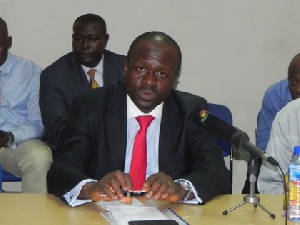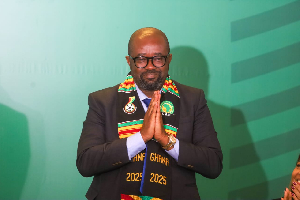The Interconnect Clearing House will provide a common, independent mechanism, to resolve disputes and the settlement of interconnect accounting traffic for all the existing and future Operators in Ghana.
Dr Edward Kofi Omane Boamah, Minister of Communications said, when established in Ghana, the Interconnect Clearing House would, for instance, help to resolve disputes such as was made to his office by MTN against Expresso for transiting and terminating international traffic, using masked or blank Caller Line Identification (CLI) on its network.
He said Cabinet has already approved the policy for the implementation of the Interconnect Clearing House, and that consultations had already been held with stakeholders, including the telecom service providers.
Dr Omane Boamah made these remarks on Wednesday in Accra in a speech read on his behalf by Mr Issah Yahaya, Chief Director of the Ministry, during a public forum on Interconnect Clearing House System in Ghana, organized by the National Communications Authority (NCA).
He said government had taken policy decisions as part of regulatory enhancements, to improve telecommunications oversight in Ghana, which include the establishment of Interconnect Clearing House Licence system for regulation of telecommunications.
The rest are the introduction of International Wholesale Carrier Licence, the implementation of Unified Access Service Licence and Renewal of Mobile Telecom licences, and the introduction of Mobile Network Operations Licence.
He said the Communications sector in Ghana had witnessed tremendous improvements since its liberalisation and reforms undertaken in the middle nineteen-nineties.
Dr Omane Boamah observed that Ghana is recognised by the International Telecommunication Union (ITU) as one of most dynamic ICT countries in the world.
He said this was in recognition of a supportive enabling environment for investment relying on a forward-looking national ICT for development policy, pro-business, telecommunications regulatory regime, abundance of broadband capacity, Applications technology, and the increasing deployment of Value Added Services.
He said modern telecommunications and technology development are key instruments in the transformation of the country, and the expansion of the national economy to achieve a lower middle income status.
The Minister said substantial investments in terrestrial optic fibre infrastructure, the introduction of LTE Four Generation technology, and the competition in the submarine optic fibre cable infrastructure market, have ensured widespread availability of broadband and massive bandwidth for data transmission and adequate capacity for internet connectivity.
He said the country possesses 12.3 Terabits capacity for international connectivity, nearly a quarter of the sub-region’s total capacity.
He noted that with the fast pace of technological developments in the industry, especially in the era of convergence, it was now possible for the same medium to be employed for the transmission of both voice and data, for which reason communications regulations require periodic review to cover the deployment of Next Generation Network (NGN) infrastructure.
“The strategic nature of communications technology requires transparency and accountability form service providers that will respond to the sovereign interests of the countries in which they operate,” the Minister stated.
“Times are changing and we in Ghana will change with the times. Let us be reminded that the provisions of the World Conference on International Telecommunications 2012 come into effect next year and this will also affect the operation of telecom services.”
He said its provisions on International mobile roaming require increased transparency in international mobile roaming charges, and to foster competition, which should benefit consumers.
“In fostering an enabling environment for the greater growth of the Internet, it discourages unsolicited bulk electronic communications (spam), and calls on countries to take measures to prevent its propagation.
“More important are the Provisions to deal with misuse of numbering resources: ‘Member States shall endeavour to ensure that international calling line identification (CLI) information is provided taking into account the relevant ITU-T Recommendations.
“In this respect, it is appropriate for Ghana to introduce the policy guidelines such as the issuance of the Interconnect Clearing House Licence,” he said.
Mr Ikechukwu Nnamani, President and Chief Executive Officer of Medallion Communications, Nigeria, which provides interconnect exchange clearinghouse services, urged the NCA to be involved in the implementation of the Interconnect Clearing House System in Ghana.
The NCA will start implementing the Interconnect Clearing House in Ghana by June, 2015, and all telecos are required to comply with it.
Regional News of Friday, 28 November 2014
Source: GNA













